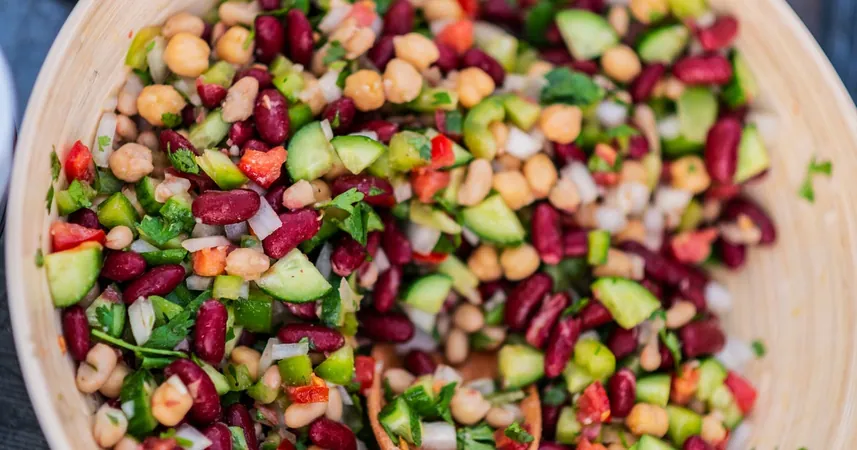
3 Warning Signs You're Not Getting Enough Fiber in Your Diet!
2025-04-05
Author: Chun
The Importance of Fiber
Fiber is crucial for maintaining excellent gut health, preventing constipation, regulating blood sugar, and even lowering the risk of colorectal cancer. Experts suggest that adult women need about 25 grams of fiber daily, while men should aim for 38 grams until age 50, tapering off afterward. Sadly, most Americans consume only 10 to 15 grams of fiber per day, falling dramatically short of these recommendations.
What Exactly is Fiber?
Fiber comes primarily from plant-based foods such as fruits, vegetables, whole grains, nuts, and legumes. It exists in two forms: soluble, which dissolves in water to form a gel-like substance that helps lower cholesterol and stabilize blood sugar; and insoluble, which adds bulk to stool and aids in digestion. The more colorful and varied your plate, the more likely you are to consume the fiber your body craves!
3 Signs You're Not Getting Enough Fiber
1. Regular Constipation: If you're struggling with infrequent bowel movements, it’s a clear indication that your fiber intake is lacking. Fiber is essential for adding bulk to your stool and easing its passage through the digestive tract.
2. Hunger Strikes Soon After Meals: If you find yourself raiding the fridge shortly after eating, it might be due to a lack of fiber. Without adequate fiber, you’re more likely to consume foods high in refined sugars and processed carbs, leading to rapid spikes and drops in blood sugar, leaving you feeling hungry again in no time.
3. Uncomfortable Digestive Symptoms: Experiencing bloating, gas, or cramping? These are also signs that you might not be meeting your daily fiber requirements. Fiber keeps your gut clean and functioning smoothly; without it, you might encounter unpleasant symptoms.
How to Boost Your Fiber Intake
- Incorporate More Plant Foods: Focus on whole fruits, vegetables, seeds, nuts, and whole grains. For instance, a cup of lentils offers 18 grams of fiber, while a single serving of chia seeds packs a whopping 10 grams.
- Make Smart Grain Choices: Replace white bread and rice with whole-grain alternatives. However, always check the labels to confirm they're made from whole grains—not just dyed to look healthier.
- Consider Gradual Changes: Slowly increase your fiber intake to avoid digestive discomfort. Start by adding an extra serving of vegetables or fruit to your meals each day.
- Fiber Supplements vs. Fiber-Rich Foods: While supplements may seem convenient, they don't provide the same benefits as dietary fiber from whole foods. Real foods deliver a complex array of nutrients along with fiber that supplements can't replicate.
If you're uncertain about your fiber consumption, consulting with a dietitian can provide invaluable guidance and even suggest keeping a food diary to assess your intake better.
Final Thoughts
Increasing your daily fiber intake can dramatically enhance your gut health, regulate digestion, and might even help lower your cancer risk. Taking small steps to add fiber can lead to significant health improvements, making it a total win-win situation! Don’t wait—start making those healthy changes today! Your body will thank you!


 Brasil (PT)
Brasil (PT)
 Canada (EN)
Canada (EN)
 Chile (ES)
Chile (ES)
 Česko (CS)
Česko (CS)
 대한민국 (KO)
대한민국 (KO)
 España (ES)
España (ES)
 France (FR)
France (FR)
 Hong Kong (EN)
Hong Kong (EN)
 Italia (IT)
Italia (IT)
 日本 (JA)
日本 (JA)
 Magyarország (HU)
Magyarország (HU)
 Norge (NO)
Norge (NO)
 Polska (PL)
Polska (PL)
 Schweiz (DE)
Schweiz (DE)
 Singapore (EN)
Singapore (EN)
 Sverige (SV)
Sverige (SV)
 Suomi (FI)
Suomi (FI)
 Türkiye (TR)
Türkiye (TR)
 الإمارات العربية المتحدة (AR)
الإمارات العربية المتحدة (AR)